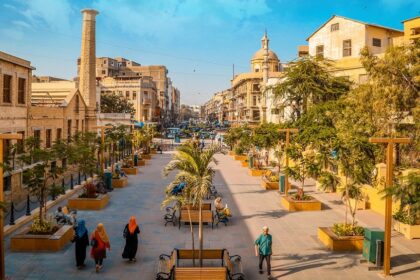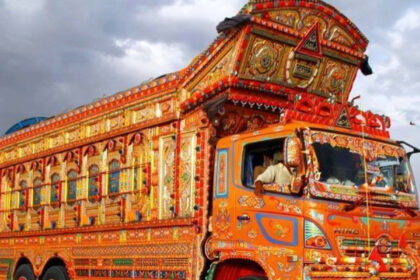As the use of streaming platforms spreads across the globe, so does a recurring theme in series and movie productions: works of global prestige. Netflix is one such example, as it offers a variety of these international productions, including The Crown and The Diplomat, to name a few. Many of these TV shows are concentrated with colonial aesthetics or heated politics that often revolve around the desire for power. With settings of grand palaces or high-security consulates, to the eloquent dialogue and lush cinematography, these shows are appealing but tend to sugarcoat the other side of their story.
Luxury on Screen, Truth off Stage
These popular TV shows are praised for their opulent craftsmanship and cinematography. As a result, they rely heavily on these aspects to boost their exposure and popularity, often suppressing what goes on behind the cameras of the fictional world. The Diplomat, for instance, introduces viewers to the world of international relations, portraying ambassadors as grand, elegant figures who are treated with utmost respect. This attention to detail essentially makes politics seem engaging and often enjoyable (with the subtle hints of satire in the show). However, in highlighting the glamour of diplomacy (or other similar examples), such shows can overlook the more difficult realities behind the spotlight. By focusing on beauty and luxury, these producers risk presenting a version of global affairs that feels entertaining, basically disregarding the underlying complexities that come with the job.
Spectacle as a Distraction
Some might argue that producers create shows of luxury and aristocracy to compete with other leading titles—but what happens when beauty becomes a shield? Costumes, lighting, and grand production can distract audiences from the uncomfortable truths behind the spectacle. Viewers get engrossed in the tragic romances and expensive perks, while producers suppress any radical critique of empire or state power. By focusing on visual appeal, producers tend to block out dark histories of controversy and exploitation. Symbols like wealth and power make shows seem important, but they also avoid worrying questions about injustice or inequality. In this way, spectacle does not only entertain — it also blocks audiences from seeing the full picture.
Why Do Producers Do This?
There are several reasons why producers may create such content. With very few people experiencing the prestigious lifestyle that is portrayed on TV, creators may think that if they create media that replicates that aspiration, then people will be engrossed in it solely based on how lavish the setting may be or how striking the actors may dress. In this way, audiences can temporarily escape their potentially mundane and monotonous way of life and watch an episode or two of quality drama or luxurious manners. In a crowded streaming market, this presentation of spectacle is often what stands out the most, and for global platforms like Netflix, this means investing heavily in these stories. These shows are packaged and marketed in a way that makes international viewers relate to specific and potentially inaccurate stories without the need for much historical context. Additionally, by focusing on aspects like personal relationships, romance, and dramatic tension, producers ensure that complex histories or radical decisions are kept digestible, increasing a show’s chances of success.
What’s Being Hidden Behind the Grandeur?
Despite the appeal, much of what is behind the spotlight is kept hidden. Extravagant sets and dramatic storylines can easily overshadow uncomfortable truths and controversies. For example, the wealth that built these grand settings often came from colonised lands, heavy taxation, or labour exploitation. Such realities are rarely addressed on screen. Similarly, the human cost of conflict, discordance, or foreign intervention can be sidelined when the focus shifts to personal intrigue or romantic subplots. This selective portrayal risks softening audiences to injustices and imbalances that shaped—in some cases, still shape—entire regions. When conflict, diplomacy, or royalty are presented mainly through elegant visuals and interpersonal drama, the broader systems that shape these realities—exploitation, displacement, or political decisions—risk being reduced to background noise. As a result, audiences may come away entertained but less aware of the complex histories or present-day struggles that continue to shape the societies depicted on screen.
The Silence of Local Producers
The dominance of globally marketed prestige television often leaves local storytellers and niche perspectives struggling for recognition. While Western-funded shows about foreign prestige frequently receive large budgets and international credit, smaller productions by local writers rarely receive the same attention. This can discourage authentic stories that highlight local struggles or tackle uncomfortable questions of a niche region’s history. Instead, local audiences may see their histories told back to them through an outsider’s gaze, shaped to entertain foreigners rather than spark meaningful discussions at home, sometimes giving a false image of the locals. In the long term, this idea risks narrowing what kinds of narratives are seen as valuable or exportable, sidelining authentic or fresh ideas that could add variety to global screens.
Beyond the Glamour
As streaming platforms grow globally, prestige television like The Diplomat, Fauda, and The Crown continue to attract viewers simply because they “look luxurious”. However, by focusing on spectacle and simplified narratives, these shows often obscure complex histories and local narratives. This limits local voices, mainly from the Middle East and South Asia, and narrows the stories that reach global screens. Moving forward, it shows that balanced, engaging storytelling with truthful representation is needed, giving space to diverse perspectives beyond spectacle and grandeur.













